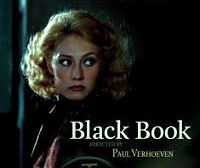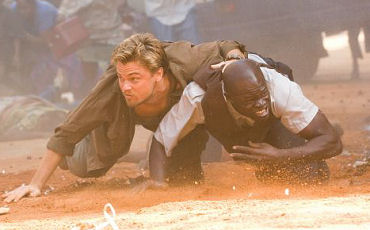I didn’t hear anything all that good about Michael Ian Black‘s The Pleasure of Your Company during the Toronto Film Festival. Maybe I wasn’t talking to the right people. Whatever the rumble, MGM has acquired the North American rights to this GreenStreet Films and Fugitive Films co-production….go figure.
Day: September 21, 2006
Nicholson to Hedegaard
“I mean, I get depressed like everybody. I have angst. I have anxiety. I worry about the world. Nobody was expecting the kind of fearful times that we live in. It’s really out of the blue. It’s like, ‘My God, what the hell is happening?‘” — Jack Nicholson (plugging The Departed is his usual roundabout way) to Erik Hedegaard in a relatively fresh-off-the-vine issue of Rolling Stone.
Verhoeven’s “Black Book” & SPC
It would be nice if Toronto Film Festival slackers like myself had a shot at seeing films they wanted to catch in Toronto but didn’t. Like Paul Verhoeven‘s Black Book, which Sony Classics has acquired for distribution in North America and other territories. I didn’t prioritize it in Toronto, frankly, because of mixed word of mouth…but then Variety‘s Robert Koehler convinced me it was worth seeing. Now comes an announcement that the Netherlands has submitted Black Book, a sexually- pronounced World War II drama, as its official foreign language entry for the Oscars.

Zack Snyder’s “300”
A trailer for Zack Snyder‘s 300 used to be on this AICN page, but it appears to have been taken down. (I don’t know what happened.) I know the film is based on the Frank Miller graphic novel of the same name — kind of a Sin City take on the Battle of Thermopylae. Impressively stylish (or do I really mean stylishly impressive?), but also over the top. People like me are always looking for ground-level echoes while graphic-novel guys are always looking for “whoa!” and “awesome!” More’s the pity since the story — how 300 Spartans held back tens of thousands of attacking Persians in order to give their countrymen time to prepare themselves against invasion — has real relevance to today’s events. Just as Kingdom of Heaven worked as an allegory about the current tensions in the Middle East, 300 reflects on some level the struggle between the Persians (i.e., Iranians) and the west, which has been raging off and on for over 2500 years. (Thanks to Rich Swank for the heads-up.)
Hot Trackers
The only 9.22 opener that looks like anything commercially is Jackass Number Two (Paramount) with, according to a tracking survey, an 81% general awareness, 40% definite interest and 13% first choice. (It also has a 25% definitely not interested, but that’s just the older audience harumphing.) The two liveliest 9.29 openers, to go by the numbers, are The Guardian — 62, 36, 8 — and the animated Open Season — 47, 32, 3. (32% definite interest among adults is a very strong number for a kids film.) And The Departed (Warner Bros., 10.6) is looking very strong — 55, 43 and 7.
Impotence, despair, unrequited love
Suber Lesson #5: “There are three things that a memorable popular film is never about — (1) unrequited love, (2) impotence, and (3) despair. In real life, people experience unrequited love, impotence and despair all the time. But the gospel of popular entertainment is based on individualism” — the belief that you can become anything and anyone if your determination and inner resources are up to the task — “and anything that suggests otherwise is forbidden.”
Not literally forbidden, Suber is saying, but pretty much isolated, marginalized… barred from the realm of mass-acceptance. Which has nothing to do with critics and Oscar prognosticators admiring this or that film and running it up the flagpole, etc. I’m talking about the reactions of Academy members and Average Joe ticket-buyers.
As much as I admire Todd Field‘s Little Children for the craft and care that went into every aspect of it, and for the fully lived-in performances from Kate Winslet, Patrick Wilson, Jackie Earl Haley, Jennifer Connelly and Noah Baumbach, its conclusion delivers impotence (immature people unable or unwilling to stand up and grapple with serious personal issues that stand in the way of happiness and fulfillment) and despair (ditto) in spades. I saw it a second time last night and this fact hit me like a ton of bricks as I talked about it with journo colleagues in the New Line Cinema basement garage.
It saddens me to say this, but it’s inescapably true. This impotence-and-despair factor will probably block any Best Picture consideration as far as Little Children is concerned. The only real Oscar nom equation with any heat at this stage is Kate Winslet for Best Actress.
Roger Michell’s Venus, on the other hand, hits the trifecta — it’s about a very old man (Peter O’Toole) who has a bad case of unrequited love for a younger girl (who requites his feelings to some extent as the film moves along), plus he discovers that he’s literally impotent at the halfway point, plus he has periodic bouts of despair due to the inescapable fact that his life is near the end. And yet O’Toole’s desire to feel life coursing through his veins is strong and persistent throughout, and so the film finally is not informed or characterized by Suber’s three no-no’s as much as the spiritual negation of same.
DiCaprio for Best Actor?
“…then I realized, Gawd laeft this playce a lawwng time ago“…that’s Leonardo DiCaprio ‘s final line in the trailer for Ed Zwick’s Blood Diamond (Warner Bros., 12.15). This is being positioned by Warner Bros. as an Oscar-worthy movie, but The Last Samurai taught everyone that you have to be careful with Zwick. He can be tasteful and restrained at times, but also ham-fisted — for my money his emotional points have too often been underlined with a black felt-tip marker.

But the trailer tells me that DiCaprio — one of the three leads in Diamond, along with Djimon Honsou and Jennifer Connelly — is a strongly positioned Best Actor candidate. We all know that the Academy always responds to actors playing (a) handicapped characters, (b) characters with exotic accents (i.e., the Meryl Streep syndrome), and (c) characters that have required the actor to put on weight, wear a fake nose or teeth, or otherwise make him/her look less attractive than normal. DiCaprio’s South African accent in the trailer (which sounds pretty good to me — can any South African readers tell us if it sounds right to them?) indicates he’s definitely lived up to the Streep syndrome.
This means he’s on the brink of entry into the Best Actor finals if….if (and I can’t underestimate the importance of this qualification) Zwick’s film isn’t too Samurai– like. If Diamond turns out to be as compelling as it could be (it’s apparently an action-fortified moral tale about greed and redemption, set against the backdrop of the Sierra Leone civil war of the 1990s with DiCaprio playing a guilt-wracked South African mercenary), the combined heft of Leo’s morally-flawed-guy-who- becomes-a-man-of-honor plus his hard-punch performance as a mole inside a criminal gang in Martin Scorsese‘s The Departed could put him near the top of the heap and right up against Peter O’Toole (Venus), Forest Whitaker (The Last King of Scotland) and Derek Luke (Catch a Fire) and…who else?
I know, I know…Will Smith in The Pursuit of Happyness, right? But think about it — doesn’t Smith need to be bitch-slapped and kept down for playing the role of the rich, over-pampered movie-star smoothie and starring in Wild Wild West , Independence Day, Shark Tale and other such shite? Smith is a natural-born charmer with a gleaming smile who’s really good when he’s talking with Access Hollywood reps on the red carpet, and now that he’s shifting into major heart-tug mode in Happyness (and opposite his own son yet) we’re supposed to just topple …is that it?
“Flags” & Halbfinger
Clint Eastwood‘s Flags of Our Fathers (Dreamamount, 10.20), the WWII epic about Iwo Jima and the p.r. effort to celebrate the men who raised the flag atop Mt. Surabachi, began screening for selected journalists this week in New York, according to a 9.21 N.Y. Times piece by David Halbfinger.
He calls it “a big, booming spectacle that sprawls across oceans and generations,” with “much of [it] following the flag raisers as they crisscross the country in the spring and summer of 1945 pitching war bonds for a government in desperate financial straits. It is neither a pure war movie nor, given its sweeping and harrowing combat sequences, merely a wartime drama. It examines the power of a single image to affect not only public opinion but also the outcome of a war.
“Above all it is a study of the callous ways in which heroes are created for public consumption, used and discarded, all with the news media’s willing cooperation. And it is imbued with enough of a critique of American politicians and military brass to invite suspicions that Hollywood is appropriating the iconography of World War II to score contemporary political points.
“Yet just when it verges on indicting the people responsible for exploiting the troops, the movie comes round to their point of view.”
This last bit reads like a critique, no? Is Halbfinger saying Eastwood cops out or pulls his punches on some level? Left Coast critics and journos wll begin to see Flags sometime next week.
